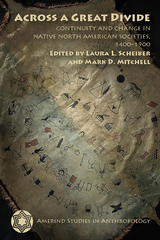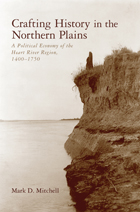2 books by Mitchell, Mark D.

Across a Great Divide
Continuity and Change in Native North American Societies, 1400–1900
Edited by Laura L. Scheiber and Mark D. Mitchell
University of Arizona Press, 2010
Archaeological research is uniquely positioned to show how native history and native culture affected the course of colonial interaction, but to do so it must transcend colonialist ideas about Native American technological and social change. This book applies that insight to five hundred years of native history. Using data from a wide variety of geographical, temporal, and cultural settings, the contributors examine economic, social, and political stability and transformation in indigenous societies before and after the advent of Europeans and document the diversity of native colonial experiences. The book’s case studies range widely, from sixteenth-century Florida, to the Great Plains, to nineteenth-century coastal Alaska.
The contributors address a series of interlocking themes. Several consider the role of indigenous agency in the processes of colonial interaction, paying particular attention to gender and status. Others examine the ways long-standing native political economies affected, and were in turn affected by, colonial interaction. A third group explores colonial-period ethnogenesis, emphasizing the emergence of new native social identities and relations after 1500. The book also highlights tensions between the detailed study of local cases and the search for global processes, a recurrent theme in postcolonial research.
If archaeologists are to bridge the artificial divide separating history from prehistory, they must overturn a whole range of colonial ideas about American Indians and their history. This book shows that empirical archaeological research can help replace long-standing models of indigenous culture change rooted in colonialist narratives with more nuanced, multilinear models of change—and play a major role in decolonizing knowledge about native peoples.
The contributors address a series of interlocking themes. Several consider the role of indigenous agency in the processes of colonial interaction, paying particular attention to gender and status. Others examine the ways long-standing native political economies affected, and were in turn affected by, colonial interaction. A third group explores colonial-period ethnogenesis, emphasizing the emergence of new native social identities and relations after 1500. The book also highlights tensions between the detailed study of local cases and the search for global processes, a recurrent theme in postcolonial research.
If archaeologists are to bridge the artificial divide separating history from prehistory, they must overturn a whole range of colonial ideas about American Indians and their history. This book shows that empirical archaeological research can help replace long-standing models of indigenous culture change rooted in colonialist narratives with more nuanced, multilinear models of change—and play a major role in decolonizing knowledge about native peoples.
[more]

Crafting History in the Northern Plains
A Political Economy of the Heart River Region, 1400–1750
Mark D. Mitchell
University of Arizona Press, 2013
The histories of post-1500 American Indian and First Nations societies reflect a dynamic interplay of forces. Europeans introduced new technologies, new economic systems, and new social forms, but those novelties were appropriated, resisted, modified, or ignored according to indigenous meanings, relationships, and practices that originated long before Europeans came to the Americas. A comprehensive understanding of the changes colonialism wrought must therefore be rooted in trans-Columbian native histories that span the centuries before and after the advent of the colonists.
In Crafting History in the Northern Plains Mark D. Mitchell illustrates the crucial role archaeological methods and archaeological data can play in producing trans-Columbian histories. Combining an in-depth analysis of the organization of stone tool and pottery production with ethnographic and historical data, Mitchell synthesizes the social and economic histories of the native communities located at the confluence of the Heart and Missouri rivers, home for more than five centuries to the Mandan people.
Mitchell is the first researcher to examine the impact of Mandan history on the developing colonial economy of the Northern Plains. In Crafting History in the Northern Plains, he demonstrates the special importance of native history in the 1400s and 1500s to the course of European colonization.
[more]
READERS
Browse our collection.
PUBLISHERS
See BiblioVault's publisher services.
STUDENT SERVICES
Files for college accessibility offices.
UChicago Accessibility Resources
home | accessibility | search | about | contact us
BiblioVault ® 2001 - 2024
The University of Chicago Press









